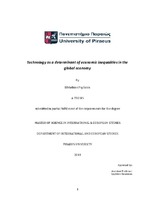Technology as a determinant of economic inequalities in the global economy

Προβολή/
Λέξεις κλειδιά
State ; Technological change ; Automation ; Inequality ; EducationΠερίληψη
Rising inequalities are one of the major concerns of the world’s scientific community nowadays. The following research examined the correlation between technological change and increased inequalities for the period after 1970s. "Skill biased technological change" induced the increase in inequalities during 1970s, as relative productivity and demand of skilled labor increased over the unskilled labor. In addition, the interaction of technological change with the transformation of firms’ organization, deunionization and international trade were proven as key determinants for the increase in inequalities. Another key determinant of increased inequalities is technological change of capital intensity induced by corporations. Furthermore, the impact of automation on jobs and wages was examined and a negative correlation was found. The fact that automation induces unemployment was based on the argument of technological unemployment and in historical data. More specifically, different occupational categories were affected and 47% of jobs in US are confronted with high risk to computerization and robotic replacement in the future. According to specific researches on US and European labor markets, industrial robots' usage has a negative impact on jobs and wages. To conclude, the crucial role of State, education, culture and society is emphasized in order to decrease inequalities in the new digital era.


